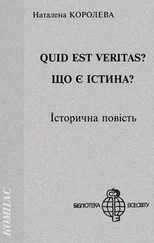Rita Monaldi - Veritas
Здесь есть возможность читать онлайн «Rita Monaldi - Veritas» весь текст электронной книги совершенно бесплатно (целиком полную версию без сокращений). В некоторых случаях можно слушать аудио, скачать через торрент в формате fb2 и присутствует краткое содержание. Жанр: Исторический детектив, на английском языке. Описание произведения, (предисловие) а так же отзывы посетителей доступны на портале библиотеки ЛибКат.
- Название:Veritas
- Автор:
- Жанр:
- Год:неизвестен
- ISBN:нет данных
- Рейтинг книги:3 / 5. Голосов: 1
-
Избранное:Добавить в избранное
- Отзывы:
-
Ваша оценка:
- 60
- 1
- 2
- 3
- 4
- 5
Veritas: краткое содержание, описание и аннотация
Предлагаем к чтению аннотацию, описание, краткое содержание или предисловие (зависит от того, что написал сам автор книги «Veritas»). Если вы не нашли необходимую информацию о книге — напишите в комментариях, мы постараемся отыскать её.
Veritas — читать онлайн бесплатно полную книгу (весь текст) целиком
Ниже представлен текст книги, разбитый по страницам. Система сохранения места последней прочитанной страницы, позволяет с удобством читать онлайн бесплатно книгу «Veritas», без необходимости каждый раз заново искать на чём Вы остановились. Поставьте закладку, и сможете в любой момент перейти на страницу, на которой закончили чтение.
Интервал:
Закладка:
Greedily sipping an infusion of boiling herbs, I watched our little boy at his play and at the same time leafed through the New Calendar of Krakow for the year 1711, which I had picked up somewhere. It was now nearly midday, and at the eating house, for the modest price of 8 kreutzer, I had just consumed the usual lavish meal of seven dishes laden with various meats, which would have sufficed for ten men (and twenty of my size), a meal that is served in Vienna every day of the week to any humble artisan, but which in Rome only a prince of the Church would be able to afford.
I would never have imagined, just a couple of months earlier, that my stomach could feel so full.
And so I now made use — as I did every day — of Cloridia’s salutary digestive infusions, and sank sluggishly into my beautiful brand-new armchair of green brocatelle.
Yes, in this one-thousand-seven-hundred-and-eleventh year since the birth of Our Redeemer Jesus Christ, or — as the calendar recorded — 5,660 years since the creation of the world; 3,707 years since the first Easter; 2,727 since the construction of the temple of Solomon; 2,302 since the Babylonian captivity; 2,463 since Romulus founded Rome; 1,757 since the beginning of the Roman Empire with Julius Caesar; 1,678 since the Resurrection of Jesus Christ; 1,641 since the destruction of Jerusalem under Titus Vespasian; 1,582 since the institution of the 40-days’ fast and since the holy fathers made baptism mandatory for all Christians; 1,122 years since the birth of the Ottoman Empire; 919 years since the coronation of Charlemagne; 612 since the conquest of Jerusalem under Godfrey of Bouillon; 468 since German supplanted Latin in the official documents of the chancelleries; 340 since the invention of the arquebus; 258 since the fall of Constantinople into the hands of the Infidel; 278 since the invention of the printing press by the genius of Johannes Gutenberg of Mainz and 241 since the invention of paper in Basel by Anthony and Michael Galliciones; 220 since the discovery of the New World by Christopher Columbus of Genoa; 182 years since the first Turkish siege of Vienna and 28 years since the second and last one; 129 since the correction of the Gregorian calendar; 54 years since the invention of the upright clock; 61 years since the birth of Clement XI, our Pontiff; 33 since the birth of His Caesarean Majesty Joseph the First; 6 years since his ascension to the throne; well yes, in this most glorious Annus Domini in which we found ourselves, Cloridia and I owned an armchair — well, two actually.
They had not been a gift from some compassionate soul: we had purchased them with the proceeds of our small family business and we were enjoying them in our lodgings inside the Augustinian convent, where we were still living while we waited for an extra storey to be added to our house in the suburb of the Josephina.
This day, the first Thursday after Easter, fell almost two months after our arrival in the Caesarean capital and our life now showed no traces of the famine that had afflicted us in Rome.
This was all thanks to my job as a chimney-sweep in Vienna — or, to be more precise, as “Master Chimney-sweep by Licence of the Court”, hofbefreiter Rauchfangkehrermeister, as it is known round here, where even the humblest ranks will not forgo the gratification of a high-sounding title. That which in Italy was considered, as I have already said, one of the vilest and most degrading of trades, was regarded here, in the Archduchy of Austria above and below the Enns, as an art, and one that was held in high esteem. Back there we were seen as harbingers of ill, whereas here people competed in the streets to touch our uniforms because (it was said) we brought good luck.
That was not all: the job of master chimney-sweep brought with it not only a social position of great respect but also an enviable income. I could even say that I know no other job that is more highly esteemed or more thoroughly despised depending on the country where it is practised.
There were no ragged chimney-sweeps here, wandering from town to town, begging for a bit of work and some warm soup. No exploited children torn from needy families; no fam, füm, frecc , or “hunger, smoke, cold”, the three black condottieri that give their names to the wretched trade in the poor Alpine valleys of northern Italy.
One had but to leave those valleys behind and enter the imperial city to find everything turned on its head: in Vienna there were no roaming chimney-sweeps but only well-established ones, with all the formalities of regulation, confraternity memberships, fixed charges, (12 pfennig , or baiocchi , for a regular cleaning), official pecking orders (master, assistant and apprentice) and convenient home-cum-workshops, which often — as in my case — came complete with courtyard and vineyard.
And, to my great surprise, the Viennese chimney-sweeps were all Italian.
The first ones had arrived two centuries earlier, together with the master builders who had brought with them the Italian genius for architecture and building techniques. As houses grew in number and density, fires broke out more frequently, so that Emperor Maximilian I decided to hire the chimney-sweeps in Vienna on a permanent basis. In the headquarters of our confraternity there still hung on the wall, venerated almost like a sacred relic, a document from 1512: the Emperor’s order for the hiring as chimney-sweep of a certain “Hans von Maylanth”, Giovannino from Milan, the first of our brothers.
After a century and a half we had gained such a solid position in the city that, to practise the trade, we were issued with a licence complete with imperial permit. Since the art of chimney-sweeping had been imported into the Empire by us Italians, for two hundred years we had done all we could to keep it in our own hands. Martini, Minetti, Sonvico, Perfetta, Martinolli, Imini, Zoppo, Toscano, Tondu, Monfrina, Bistorta, Frizzi, De Zuri, Gatton, Ceschetti, Alberini, Cecola, Codelli, Garabano, Sartori, Zimara, Vicari, Fasati, Ferrari, Toschini, Senestrei, Nicoladoni, Mazzi, Bullone, Polloni. These were the names that recurred in the chimney-sweeping business: all exclusively Italian and all related to one another. And so the job of chimney-sweeping had actually become hereditary, passing down from father to son, or from father-in-law to son-in-law, or to the nearest relative, or, if there were none, going to the second husband of an eventual widow. That was not all: it could even be sold on. A rare and lucrative possession, which cost no less than two thousand gulden, or florins: a sum that very few artisans could afford! Not a day went past without my thinking gratefully of Abbot Melani’s generous action.
If my fellow chimney-sweeps, back in Italy, only knew what a hell they were living in and what a paradise was to be found just across the Alps!
I was making a very good living. Each of us chimney-sweeps was assigned a quarter or a suburb of the city. For my part, I had had the good luck, through Abbot Melani’s donation, to acquire the company responsible for the suburb of the Josephina, or the City of Joseph, from the name of our Emperor; this was a neighbourhood of modest artisans very close to the city, but it also included some summer residences of the high nobility, and with these alone I was able to earn more in a month than I had earned back home in my entire life.
As I was Italian, Abbot Melani had had no difficulty in acquiring the company for me. Futhermore, with his money he had acquired absolutely everything. He had only had to forge the documents — birth certificate, curriculum et cetera — that were necessary to prevent the confraternity of chimney-sweeps protesting to the court. To tell the truth, when I presented myself for the first time they received me rather coldly, and I could not really blame them: my appointment as chimney-sweep “by licence of the Court” did not go down well with my colleagues, who had had to sweat hard to get what had been given to me on a silver tray. I also aroused some mistrust since they had never heard of chimney-sweeps in Rome. My colleagues, in fact, all came from the Alpine valleys or even from the Ticino or the Grigioni. They accompanied me on my first cleaning assignments, to make sure that I knew how to do my job properly: Atto’s money had a lot of sway in Vienna, it was true, but it was not powerful enough to make a chimney-sweep out of an incompetent fool who might one day set the whole city alight.
Читать дальшеИнтервал:
Закладка:
Похожие книги на «Veritas»
Представляем Вашему вниманию похожие книги на «Veritas» списком для выбора. Мы отобрали схожую по названию и смыслу литературу в надежде предоставить читателям больше вариантов отыскать новые, интересные, ещё непрочитанные произведения.
Обсуждение, отзывы о книге «Veritas» и просто собственные мнения читателей. Оставьте ваши комментарии, напишите, что Вы думаете о произведении, его смысле или главных героях. Укажите что конкретно понравилось, а что нет, и почему Вы так считаете.











